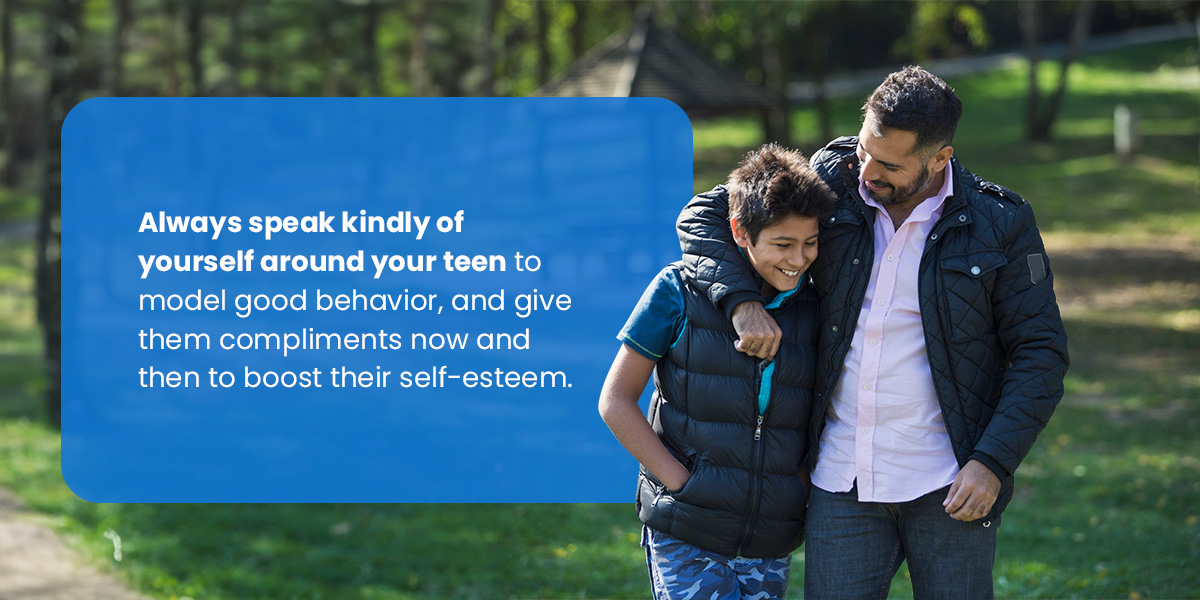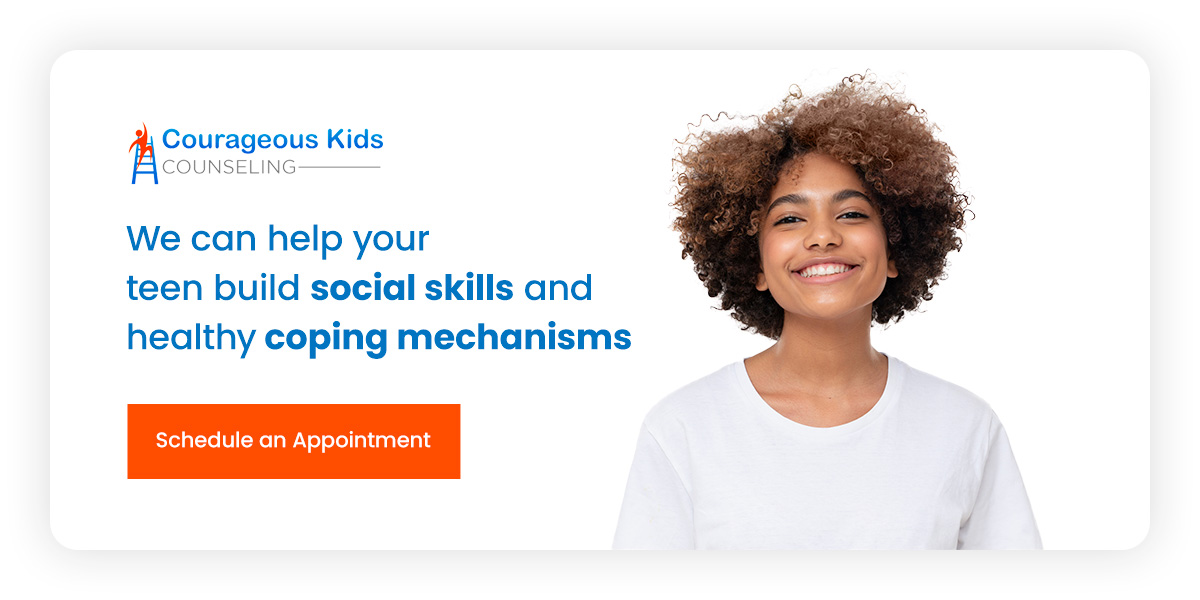Ways to Support Your Teen Making Friends
For today’s teens, finding and maintaining friends can be a difficult task. Whether they struggle with social anxiety or shyness or just haven’t found the people they connect with, watching your teen struggle to make friends can be heartbreaking. You might want to support them but feel unsure where to start. And with the added dynamics of social media, it can be challenging to help your teen form good quality friendships.
In this article, we’ll discuss the challenges and barriers teenagers face when making friends and how you can support them in forming lasting connections.
Understanding the Challenges Teenagers Face
Teens are in the critical stage of forming relationships, finding their identities and seeking autonomy from their parents. It can be tough for them to build social skills, determine healthy vs. unhealthy relationships and form lasting friendships. Here are just a few of the challenges today’s teens face when making and keeping friends:
- Social skill deficits: Some teens have trouble with social skills, whether it’s due to anxiety, insecure attachment or trouble understanding social cues. It’s helpful to support your teen in recognizing the value of and practicing greeting others, looking people in the eyes, knowing how to make small talk and giving appropriate compliments.
- Social media: Social media has added another layer when it comes to teenagers and relationships. Connecting on social media can make it harder to determine boundaries and how often to communicate with friends or comprehend how someone is feeling due to a lack of body language. During adolescent development, the desire for attention and reinforcement from peers becomes more sensitive, which can make too much social media use a hindrance in forming healthy friendships.
- Peer pressure and adolescent behavior: Peer dynamics play a significant role in forming friendships as a teen. In high school, kids are vulnerable to cliques, peer pressure and other social problems that make it tough to build healthy relationships.
- Social anxiety: Today’s teens experience anxiety and depression more than previous generations. Social anxiety can stem from social media and an increased sense of performance pressure. Anxiety can make it harder to make friends, with many teens using avoidance as a coping mechanism in response. They may avoid being around peers or making friends for this reason.
How to Help Teens Build Friendships
If your teen struggles to make friends or find people they can connect to, you might try these tips to help push them in the right direction:
1. Build Communication Skills
You can set your teen up for success by helping them build a strong foundation for forming relationships — social skills and communication. If your teen struggles with shyness or awkwardness, you might try a role-playing exercise to help them:
- Learn to identify and enter open conversations.
- Engage in dialogue effectively, both verbally and nonverbally.
- Learn how to self-disclose appropriately.
It’s also important that your teen knows the significance of body language. Do they cross their arms a lot or avoid making eye contact? With a little support, your teen can make themselves appear more friendly and approachable, increasing their chances of making social connections.
2. Promote Self-Confidence

Many teens struggle with their confidence. In the sensitive years between adolescence and adulthood, they might deal with identity issues or struggle with self-compassion, which can make it tough to form friendships. Be a good role model by promoting self-confidence in your home. Always speak kindly of yourself around your teen to model good behavior, and give them compliments now and then to boost their self-esteem.
Promoting self-confidence can help your teen accept themselves and their strengths, giving them the encouragement to put themselves out there and start making friends. It can also help them build resilience and coping skills to help with social setbacks.
3. Strengthen Empathy and Understanding
Being empathetic can help teens build stronger relationships, increase their tolerance of others and reduce the likelihood of bullying. Do your best to model empathetic behavior in your daily life, especially in your interactions with your teen. When your teen runs into disagreements with peers, encourage them to see the other person’s point of view and put themselves in their shoes so they know why empathy matters.
Ask them if they can see where the other person might be coming from and make a teaching moment out of it to promote more empathy and understanding.
4. Encourage Social Opportunities
If your teen struggles to put themselves out there and make connections, you might encourage them toward social opportunities. These can include:
- School clubs that involve your teen’s interests.
- Exploring hobbies with an acquaintance.
- Guiding teens toward school sports.
Group activities and social outings can encourage friendships and socialization, helping your teen practice being around others and building communication skills.
How to Navigate Challenges Together
As your teen sets out to make new connections, it’s also important that you know how to address common challenges and social setbacks. Here are some tips to help you support your teen in these instances:
- Balance support with independence: As mentioned, teens are at a time in their lives when they desire more independence and autonomy from their parents. When helping them form friendships, it’s critical to strike a balance between supporting them and allowing them to grow on their own and learn from their mistakes.
- Ensure online safety: Make sure your teen’s digital interactions are healthy and safe. Teach them about digital literacy and that they do not need to feel pressured to accept every friend request or constantly be on their phones. You might use time-setting controls or privacy locks to promote safety and discourage too much time on social media, which can prevent them from meeting new people and making friends.
- Help them make quality friendships: If your teen struggles to form healthy, deep connections with like-minded people, make sure you discuss the difference between healthy and unhealthy relationships. Identify qualities of positive friendships and help steer them in the right direction if they run into relationship issues at school or on social media.
- Build resilience to deal with rejection: It helps to build resilience so your teen can bounce back from social setbacks. Encourage self-acceptance and the importance of healthy coping skills in the face of rejection.
- Know when to seek professional help: Recognize signs that your teen might need extra support, such as mental health challenges like depression and anxiety, that keep them from interacting with peers and forming healthy relationships. Signs of social anxiety can include a fear of being around others, worrying for days before and after social events or completely avoiding public places and social situations. In these cases, professionals can help them through psychotherapy or medications.
How Courageous Kids Counseling Can Help
As human beings, we naturally yearn for connection and a sense of belonging, especially in our teen years. While teenagers can struggle to form relationships due to social media, shyness or anxiety, you can help them build their social skills and form happy, healthy friendships. It’s also critical to reach out for professional help if you feel like your teen might need additional help.
At Courageous Kids Counseling, we can help your teen build social skills and healthy coping mechanisms while addressing mental health conditions like depression and anxiety. We understand the difficulties teens face in this sensitive time of their lives, and we can help your teen navigate social setbacks like bullying, rejection, loneliness and other obstacles impacting today’s youth.
If you’re looking for an effective way to support your teen, contact us to learn about our teen counseling services.
Most teens feel a sense of confusion during that tricky time between adolescence and adulthood, and many struggle to talk about how they feel. Instead, they may express themselves through moodiness, explosions of anger or anything in between. By promoting open communication, giving them space and fostering a supportive environment, you can build bridges with your teen.
Family counseling can also help immensely during this period of your teen’s life. At Courageous Kids Counseling, our licensed therapists can provide you with the tools to foster healthier relationship dynamics with your teen. We can help uncover the issues that might be impacting your family’s well-being and move you toward a place of peace and happiness.
For family therapy services, schedule an appointment today.




